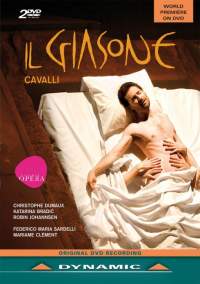CAVALLI Il Giasone
A century’s favourite opera on CD and DVD
View record and artist detailsRecord and Artist Details
Composer or Director: (Pietro) Francesco Cavalli
Genre:
Opera
Label: Dynamic
Magazine Review Date: 08/2012
Media Format: Digital Versatile Disc
Media Runtime: 190
Mastering:
Stereo
DDD
Catalogue Number: CDS66313

Tracks:
| Composition | Artist Credit |
|---|---|
| Giasone |
(Pietro) Francesco Cavalli, Composer
(Pietro) Francesco Cavalli, Composer Andrew Ashwin, Ercole; Oreste, Baritone Angélique Noldus, Alinda; Amore, Mezzo soprano Christophe Dumaux, Giasone, Countertenor Emilio Pons, Egeo; Sole, Tenor Federico Maria Sardelli, Conductor Filippo Adami, Demo, Tenor Josef Wagner, Giove; Besso, Bass-baritone Katarina Bradic, Medea, Mezzo soprano Robin Johannsen, Isifile, Soprano Symphony Orchestra of Vlaamse Opera Antwerp/Ghent Yaniv D'Or, Delfa; Eolo, Countertenor |
Author: Richard Wigmore
Cavalli manages the libretto’s almost Shakespearean shifts of tone with theatrical flair, bringing the diverse characters to life in a musical texture that alternates expressive recitative with short, dance-like arias, often in sarabande rhythm. Recitative and arioso commingle in the opera’s two most inspired scenes, Medea’s baleful invocation to the spirits of the underworld at the end of Act 1, and Hypsipyle’s final lament, with its piercing dissonant clashes.
In a brief interview on the ‘bonus’ track, producer Mariame Clément points to the plot’s zany illogicality and the necessity of emphasising the element of fantasy. The upshot is a surreal mix of ancient and modern, with a set that vaguely suggests a shanty town amid an urban wasteland. Medea is chic-glamorous, Hypsipyle, constantly breast-feeding her twins, a bedraggled gypsy. Hercules is got up as an over-muscled American footballer with Mr Spock ears, while the comic nurse Delfa – an amusingly over-the-top performance by baritonal countertenor Yaniv d’Or – looks like a cleaning lady sporting a 14th-century headdress. You get the picture. At the end Cupid cheerfully shunts all the characters into what appears to be an industrial container.
If Clément’s shabbily minimalist production eschews the breathtaking transformations envisaged by Cavalli and Cicognini, it certainly provides fair entertainment, not least in the scenes involving Demo, the crippled (when it suits him), stuttering servant-cum-jester. Using the text with the savour of a native Italian, Filippo Adami manages to remain funny on each of his successive appearances. While none of the singers have ‘early music’ voices, they all characterise with gusto. Clément’s production emphasises the over-sexed Jason’s unheroic aspect, epitomised by his camp sailor’s outfit in Act 2. With his mellifluous, rather feminine-sounding countertenor and expressive declamation, Christophe Dumaux convinces both in amorous mode and in his scene of drowsy remorse in the final act. Two sonorous bass-baritones, Josef Wagner and Andrew Ashwin, make their mark in their twin roles, while Emilio Pons, with an Italianate ring to his tone, is moving in Aegeus’s plea to Medea in Act 1. Both heroines are vocally strong, too, if occasionally a bit squally under pressure. Katarina Bradic´’s visually alluring Medea, by turn sex-kitten and formidable dominatrix, has the necessary mezzo depth for the role, while American soprano Robin Johannsen as Hypsipyle – the one character wholly free from ridicule – makes her lament a moment of profound emotional truth.
Although the strings can sound a bit scrawny, the Orchestra of Flemish Opera play with plenty of rhythmic zest. Federico Maria Sardelli paces the opera well (the colourfully varied continuo is animated, without fussiness) and provides the instrumental ritornellos missing in the sources, enlivened with recorders and/or tambourine. These presumably use music from other Cavalli operas, though the booklet gives nothing away here. Sardelli has also composed, plausibly, a scene in Act 2 for Aeolus, Cupid, Jove and chorus, for which no original music survives.
I would emphatically recommend this lively and musically convincing DVD of Cavalli’s operatic masterpiece over the CDs, where the ear inevitably focuses more on moments of vocal and instrumental roughness. Most crucial, though, is the criminal lack of libretto and translation in the CD booklet. All we get is a poorly translated synopsis. Even for Italian speakers, the comic scenes are virtually meaningless, while the sighs, swells and swoops in Medea’s opening scene, irritating as pure sound, at least make sense when we can see the sorceress’s orgasmic writhings.
Discover the world's largest classical music catalogue with Presto Music.

Gramophone Digital Club
- Digital Edition
- Digital Archive
- Reviews Database
- Full website access
From £8.75 / month
Subscribe
Gramophone Full Club
- Print Edition
- Digital Edition
- Digital Archive
- Reviews Database
- Full website access
From £11.00 / month
Subscribe
If you are a library, university or other organisation that would be interested in an institutional subscription to Gramophone please click here for further information.




